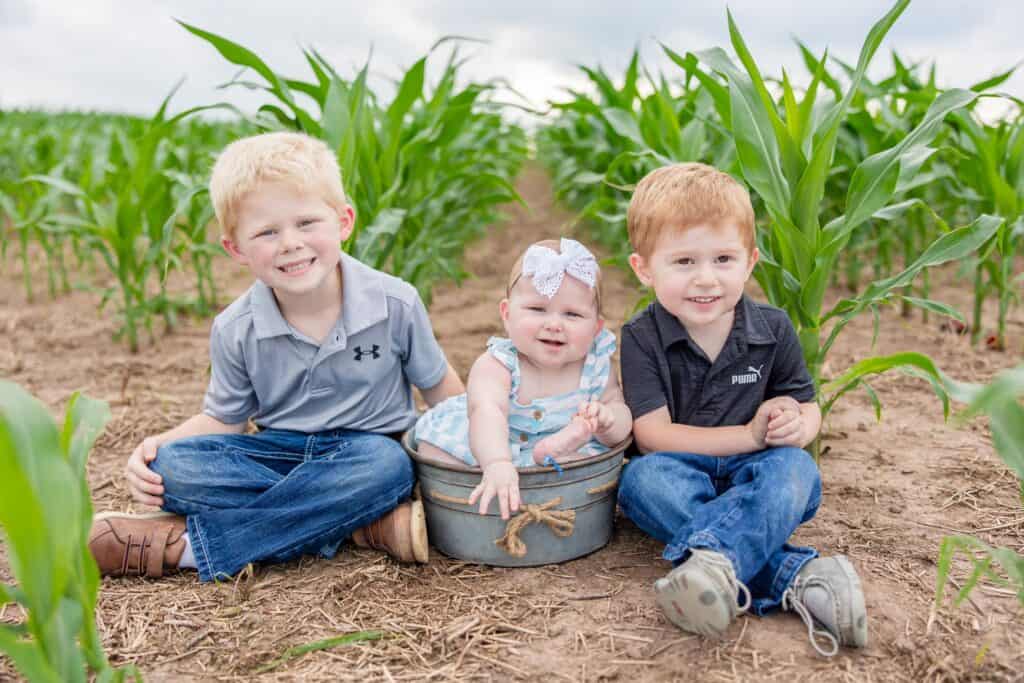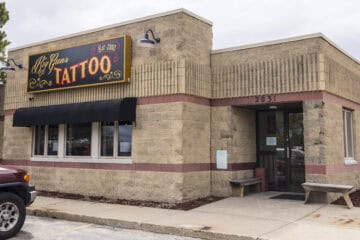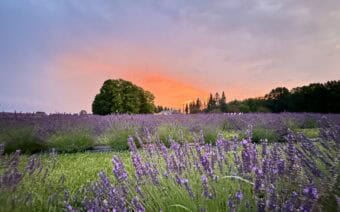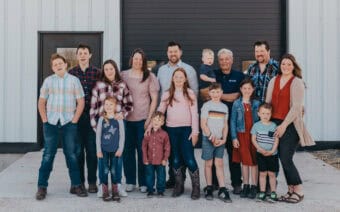
September 9, 2024
SHEBOYGAN COUNTY – For the Reicherts, farming isn’t a job – it is a way of life.
“Once you get into it, it’s in your blood and you’re just kind of hooked,” Jenny Reichert said. “We have this addiction to being busy, I’m pretty sure. We love it. We love getting outside and just getting that physical activity in. And we love our animals.”
As owners and operators of Reichert Land & Cattle in Sheboygan County, the farming duo grows row crops – corn, soybeans, wheat, alfalfa hay and sweet corn – and is considered a cow-calf operation from a beef standpoint.
“So, we have cows, they calf out and we’ll raise their young and we’ll sell some for show animals or direct-to-consumer meat products,” Jenny said. “And then the heifers, we’ll raise them and have them as replacement heifers into our herd.”
Farming for the future
The Reicherts said they believe sustainability is key to the future of the agriculture industry.
“We’re not really farming for today, but for tomorrow,” Chris said. “We always have to keep looking forward.”
Jenny said they love the ability to care for the land and try out different sustainable practices.
“We believe that what we do on our land can impact the whole community,” she said. “If we are only farming for today – that is not longevity.”
That approach, Jenny said, is only looking at what’s profitable today.
“We’re looking at tomorrow from a standpoint of: ‘can our children take this over?’” she said. “How can we continue to make the world a better place for the next generation? How can we make decisions that are going to impact our whole community and continuously improve water quality, air quality and soil quality.”

Jenny said when making decisions today, “you can’t have blinders on.”
“You always have to look at the future – how that decision you make today impacts tomorrow,” she said.
Some of that, Chris said, includes implementing sustainability practices throughout farm operations.
“Some of the big hitters that we focus on include no-till crop planting and cover crops to sustain soil health and supplemental foliage for our cattle,” he said. “We focus a lot on how we can help the environment as a whole.”
Chris said that doesn’t necessarily mean implementing practices that directly impact the farm from the cropping or cattle end of it – “but how can we impact our local habitat.”
“So whether that’s through pollinator habitat for bees, installing birdhouses, looking at water quality – really all aspects of wildlife,” he said. “I guess we’re kind of trying to be one with nature.”
When they started farming, the Reicherts said their goal was to “work hard and improve upon what we were doing ourselves.”
“We never looked for outside gratification,” Chris said.
However, the Reicherts’ sustainability practices, love of the land and planning for the future of agriculture recently got them recognized by the Wisconsin Cattlemen’s Association – receiving the Environmental Stewardship Award.
Jenny said winning the award was a shock – “because we didn’t even know we were nominated for it.”
“We were flabbergasted because we didn’t know it was coming,” she said.
Chris described the award as “the cherry on top.”

“We knew what we were doing was beneficial, but to see people recognize that, really made us feel good about what we were doing,” he said. “It gave us a lot of validity that we are on the right path and that we’re doing the right things.”
Sustainability, Jenny said, can be seen in many different ways.
The Reicherts said they see it as being sustainable on a local level.
“Some of our friends who live in urban areas might believe in some of the things that we’re doing, but don’t have the scale to do it,” Jenny said. “They can do some of these practices on their own properties, but we are fortunate enough to have the ability to do it on a larger scale. So this award was verifying, ‘yeah, these people are doing good things.’”
Looking to the future, the Reicherts said the goal, with their cattle, is to minimize workload and where they can be most efficient through a sustainability lens.
“We’re looking into some different options with implementing more grazing practices – whether that’s through cover crops or grazing, for example, corn stocks after that has been harvested in the fall, and interceding that into our corn and then grazing that later in the year,” Chris said.
The overall focus, he said, is extending the grazing season.
“Currently, we do an intensive rotational grazing program, which basically means we’re grazing from May to October,” he said. “Ideally, I wouldn’t mind grazing all the way to January if we had that ability to do so.”
The major limitation to this, Chris said, is fencing – “we’ll need to put up more fencing.”
“It’s really about taking that holistic approach and utilizing our acreage as efficiently as possible,” he said.
Setting foundation for next generation
Whether or not one, two or all three of their children end up taking over the farm in the future, the Reicherts said “we want them to understand the responsibility and hard work it takes to care for and love the animals and land that you get to care for.”
“Not everyone gets the privilege of growing up on a farm or in their country life,” Jenny said. “We want them to know that they’re lucky for one, being able to do – even though it’s a lot of hard work – and can grow up with the mindset of responsibility and caring.”

Jenny said she and Chris can utilize life on the farm to help raise their children in this manner.
“We have a responsibility to care and love the environment and our animals – it’s really easy to do if you love it,” she said.
Jenny said the best aspect of farming is “we get to do everything as a family.”
“The hardest aspect of farming is doing everything as a family – because it makes it 10 times harder,” she said.
Chris said being able to be outside – whether it’s playing, working or driving the tractor – with his three children and wife means everything to him.
“There’s nothing better than spending that time with your kids,” he said.
In terms of the big picture, Chris said the hardest part of a career in farming is the risk that accompanies the agricultural industry.
“We’re at the mercy of Mother Nature every day, and we don’t have any control over that,” he said. “That is the biggest challenge. You do everything in your power to produce a good crop or raise healthy cattle and the next thing you know you have sick cattle and poor crops.”
Finding a work/life balance and multitasking, the Reicherts, take on whole new meanings when you are living on a farm – “it’s a time commitment to farm and have three young kids on top of it.”
“It definitely takes a lot of communication,” Chris said. “Jenny and I utilize our iPhone calendars very regularly – putting as much as we can in there so we can see what each of us has going on throughout the day.”
With their kids on the cusp of starting school, he said, will offer a set of challenges as well.
“That is a very different dynamic,” he said. “Thankfully, we have great parents on both sides and a great support group amongst our family who are always willing to help at the drop of a hat. Honestly, without them, I don’t think we’d be able to do it.”
 Big Guns Tattoo making a big impact in Fox Valley
Big Guns Tattoo making a big impact in Fox Valley Letting the sun do the work
Letting the sun do the work






